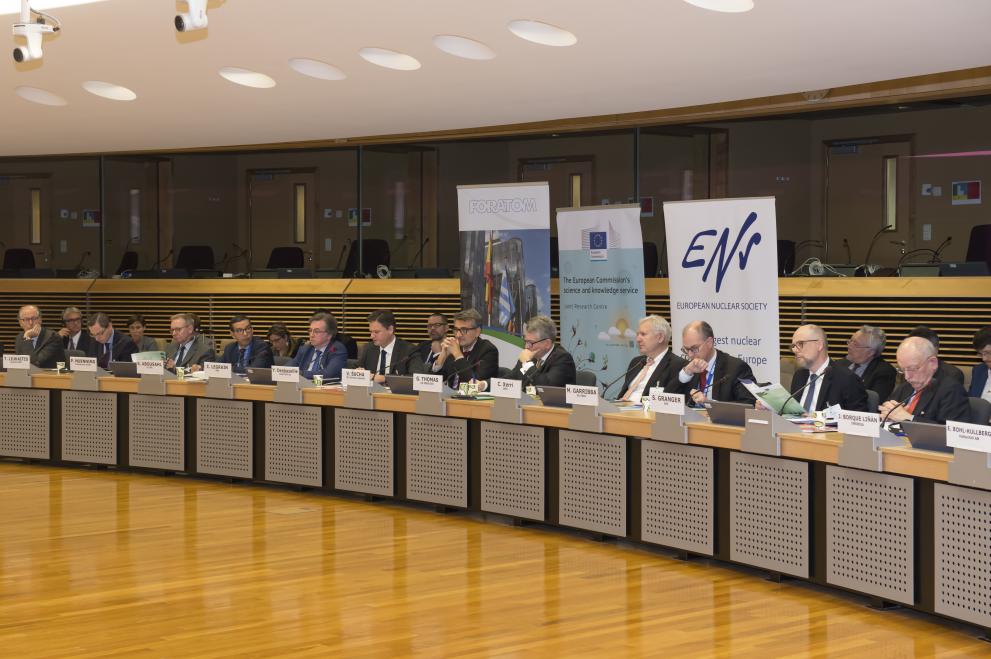
The European Commission has teamed up with industry representatives and nuclear professionals to organise a knowledge-sharing roundtable on the decommissioning of nuclear facilities.
Nuclear decommissioning is an industrial activity expected to grow worldwide.
It encompasses technical and management actions associated with ceasing operation of a nuclear installation, through its dismantling, to finally removing it from regulatory control, with the objective of delivering an environmentally friendly end-state.
To achieve that, it is necessary to further support the development of the underpinning technical expertise, and to ensure the availability of the workforce with the right level of skills in the future.
EU, industry and nuclear professionals together on decommissioning
On 23 January 2018 in Brussels, the representatives of the European Commission, industry and nuclear scientific experts met at an event organised jointly by the European Commission, Foratom and the European Nuclear Society.
The event also brought together research organisations and European and international actors to identify joint actions that could help to address the technological and practical challenges of decommissioning, and ensure that European industry remains a world leader capable of competing at the highest level in the nuclear decommissioning market.
In his opening remarks, Vladimír Šucha, Director-General of the JRC, said: "Nuclear decommissioning is an important emerging field in the EU and internationally, creating opportunities for high-skilled workers and posing new technological challenges. The JRC regularly interacts with industry, research and training organisations to ensure a common understanding of the challenges, and promote new initiatives in the field."
Standardisation supports industry
The participants discussed possible joint EU actions to address technological challenges, such as constant improving of performance, safety and minimisation of waste. Further standardisation of technological practices would benefit the industry.
The EU scientific community, including the JRC, has a key role to play to assist European industry in this endeavour, contributing to innovation, standardisation and the development of best technologies for decommissioning.
Skilled and competent workforce is the key strategic asset
The second important strand of actions that would profit from the joint actions at EU level relates to human resources and competences, including education and training. Ensuring steady supply of a competent and skilled workforce specialised in nuclear decommissioning is of strategic importance.
The JRC together with the EU partners is running a project to consolidate and improve existing professional training programmes. Attracting young talents to take up a career in the field of decommissioning is very important, as well as harmonising job qualifications for improved mobility in this profession. Regular interaction with the industry is essential to ensure the necessary efficiency.
Role of the European Commission in nuclear decommissioning
The European Commission - in its role of guardian of the Euratom Treaty – ensures that the Community establishes uniform safety standards to protect the health of workers and of the general public as well as ensuring that these standards are applied.
In 2003 the European Union Institutions underlined the importance of the safe decommissioning of nuclear installations, including long-term management of radioactive waste and spent fuel.
In the following years the Commission issued, among others, the 2006 Recommendation on the management of financial resources for the decommissioning of nuclear installations, spent fuel and radioactive waste, and, later, crucial Directives which comprehensively refined the regulatory framework in the nuclear energy sector, with enhanced focus on safety and waste management, and including decommissioning in their scope as appropriate.
These include the 2011 Directive concerning the safe and responsible management of radioactive waste and spent fuel, the 2013 Directive on the Basic Safety Standards ensuring radiation protection aspects, and the 2014 (amended) Directive on nuclear safety.
This legal framework sets requirements for the Member States to ensure that arrangements are in place for education and training, as well as research and development activities as relevant.
The European Commission is also directly involved in decommissioning activities. In 1999 the JRC started a programme to deal with its nuclear liabilities, including the dismantling of its disused nuclear facilities.
The EC has also the mandate for supervising the assistance programme to support the decommissioning of old reactors in Slovakia, Lithuania and Bulgaria, as their respective Governments committed themselves to close these reactors as part of their accession to the European Union.
The EC is coordinating the EU support under the Instrument for Nuclear Safety Cooperation mechanism for the radioactive waste management and decommissioning of nuclear facilities in third countries.
Finally, the EC has a role in the assessment and dissemination of decommissioning experience and best practices, and in the support to the necessary technological developments and training, through its research and training framework programmes.
Selected JRC activities
Within the Euratom programme, the JRC provides technical and scientific support to EU policies in nuclear safety, security and radiation protection, and carries out education, training and information activities in the field. The examples of recent activities involve launching a new training and knowledge-sharing initiative to prepare specialists for the dismantling of present and future obsolete nuclear plants in Europe, the European Learning Initiatives for Nuclear Decommissioning and Environmental Remediation (ELINDER). The JRC has also analysed needs and challenges in education and training in nuclear decommissioning, as well as gathered best practices in decommissioning and environmental remediation programmes.
Details
- Publication date
- 23 January 2018
